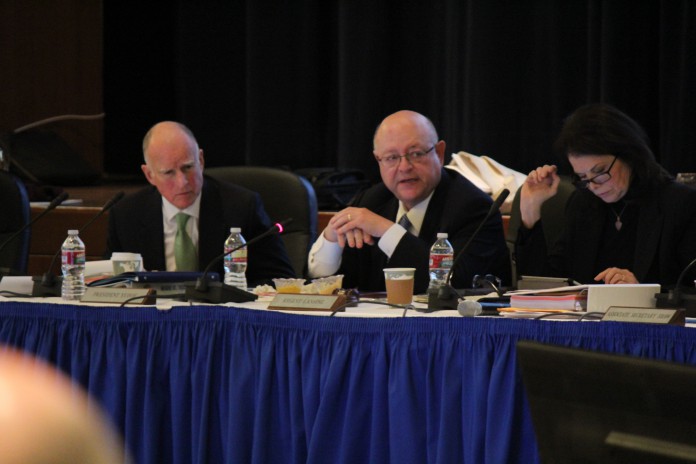Photos by Margarita Baliyan
Two words dominated the majority of the first half of the University of California Regents meeting today: online education.
Since an inaugural online pre-calculus class at UC Merced in January of 2012, the Board of Regents have been discussing the future of online education at UC. Today, with presentations from three different online education providers and Gov. Jerry Brown, the Regents made headway in their continuing discussion of how best to provide UC students with effective online courses.
“Within the next two months, I will announce a new incentive program for faculty to develop additional online courses,” said UC President Mark Yudof during his introductory remarks before the discussion. “Within a few more months, we will have completed the rudimentary infrastructure for our first system-wide catalogue of courses. These courses will be both online and classroom-based. And they will be available for degree credit to students on any UC campus.”
The tentative idea behind UC online education is that it will make up for a number of problems within the UC system and the larger California education system. By offering what are deemed “massive open online courses,” a great number of people will benefit, including students who often find themselves having to repeat large lecture classes and high school students whose schools do not offer AP or Honors classes because of low enrollment. The availability of online courses will also potentially be able to reduce the time it takes students to receive degrees.
“The work we’re going to do [for online classes] is very focused on undergraduate education, especially higher impacted classes,” said Provost Aimee Dorr, who gave a presentation on online education at UC.
According to Dorr’s presentation, as of now, 10 campuses have completed or are developing strategic plans for online education; eight campuses have established committees to evaluate, facilitate, and support online education; seven campuses have staff and resources for current demand but will need more to expand offerings; and five campuses currently offer grants or awards that encourage innovative use of technology in course design.
“What the potential for this is, is to make sure that the quality for the course is the same…it gives us the ability to serve more people,” said Chairman Sherry Lansing, addressing concerns that an online class might mean a less quality class. “We’re going to constantly be reevaluating it.”
Dorr’s presentation also mapped out plans to launch a temporary systemwide course catalog and pilot a cross-campus online course enrollment between three unspecified campuses by the end of 2013.
While many regents appeared to be on board with the university’s move toward more online education, some, like Student Regent Jonathan Stein, opposed moving forward without extensive student feedback on the issue.
“No one has asked students if they want this,” said Stein, who cited issues like lack of students actually working together, in person, on assignments as one downfall to online courses.
“Online education as supplement is acceptable and probably a good thing. Online education used to entirely substitute class education is not something we would embrace,” said Stein.
Online UC courses would potentially be hybrid courses, with everything done online via simulcast videos of lectures, online discussion boards and course materials, office hours and video analysis, and much more, save for midterms and finals which may or may not, depending on the class, be done in an actual classroom.
The Regents met with representatives from three different online education companies: Daphne Koller, co-founder and co-CEO of for-profit Coursera; Sebastian Thrun, co-founder and CEO of for-profit Udacity; and Anant Agarwal, president of not-for-profit edX. During their presentations the three representatives explained their services and showed to the board of regents what other universities are doing for online education.
“This is work worth doing,” Gov. Jerry Brown said about the discussion during a lunchtime press conference. “The claim is made that through online learning, through technology, actually people can learn more, better, and it will be cheaper in the long run. That’s a powerful claim. We’re not there yet but I’m committed to going as far down that road as we can.”











